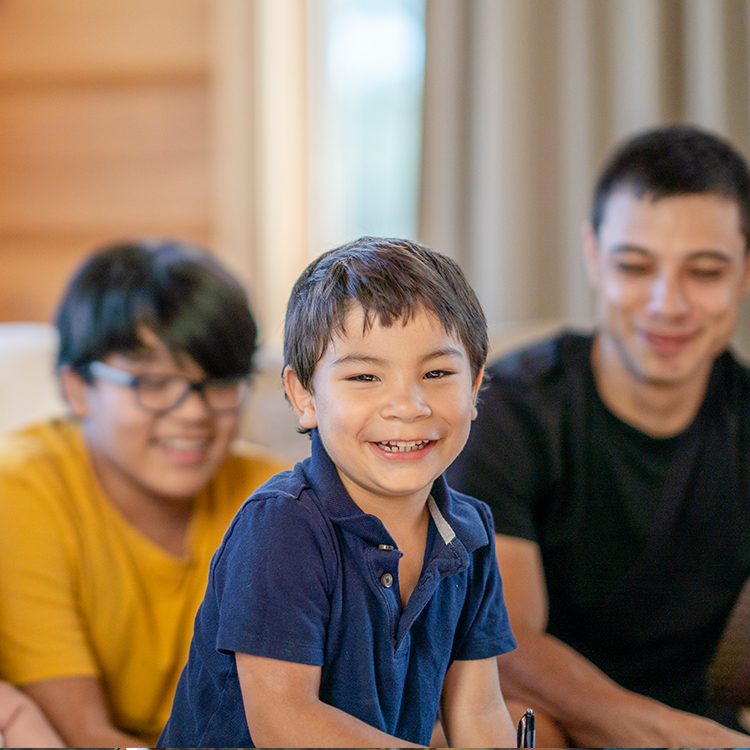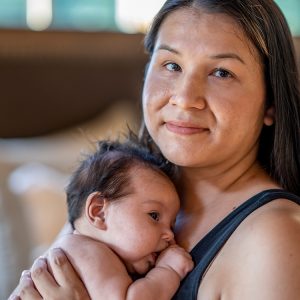Applications are now closed.
Subscribe to our newsletter to stay updated with the latest program announcements at Kids Brain Health Network.
This Indigenous-led funding stream reflects the commitment of Kids Brain Health Network (KBHN) and Brain Canada to reconciliation, respect for Indigenous leadership, and the recognition that meaningful solutions for Indigenous communities must be rooted in the knowledge, priorities, and strengths of Indigenous Peoples. In alignment with the United Nations Declaration on the Rights of Indigenous Peoples, this initiative affirms the right of Indigenous Peoples to self-determination in shaping research and programs that affect their communities.

Funding Overview:

We invite academics, in partnership with Indigenous communities, to bring forward projects that:
- Create impact to measurably improve outcomes for Indigenous children and youth with neurodevelopmental disabilities and their caregivers.
- Are grounded in community-identified priorities, Indigenous knowledge, languages, and strengthen culturally appropriate approaches to care, support, and inclusion.
- Builds capacity, including non-western knowledge capacity, of Indigenous academics and the communities being served.
- Have clearly identified goals, activities, and expected outcomes that can be measured and shared with communities.
- Demonstrate feasibility and sustainability so that projects implemented and their benefits are maintained beyond the funding period.
KBHN’s Indigenous Advisory Circle will recommend the most promising transformative proposals to address core challenges in early identification, access to evidence-based interventions and integrations, and support for families.
This program is made possible by Kids Brain Health Network and the Canada Brain Research Fund, an innovative arrangement between the Government of Canada, through Health Canada, and Brain Canada
Connection Grant - $25,000 for 1 year
 Criteria for Connection Grant
Criteria for Connection Grant
Projects funded through this stream will:
- Include Indigenous team members and strong relationships with Indigenous communities and other partners throughout
- Advance relationships with Indigenous communities, families, and organizations to co-develop an impactful project proposal (such as building an Advisory, Equitable Research Agreement, Ceremony and Cultural Events, Community Gathering, etc.)
- Recognize the diversity of Indigenous nations across Canada and respect local governance, cultural protocols, and self-determination.
- Builds trust and mutual understanding with Indigenous academics and the communities being served.
- Include meaningful engagement of people with lived and living experience throughout all project stages.
- All Knowledge Mobilization activities fully recognize and include the participation of Indigenous partners.
- Methodology respects Indigenous-led principles (e.g., OCAP, CARE, FAIR, etc.).
- Advance outcomes for children and youth with neurodevelopmental disabilities and their families across at least one of three KBHN challenge areas: Early Identification; Access to Interventions/integrations; and Family Supports
Submission Requirements for Connection Grant
Applications are closed
Community Impact Grant - $100,000/ year for 2 years
 Criteria for Community Impact Grant
Criteria for Community Impact Grant
Projects funded through this stream will:
- Have robust partnerships with the community, with co-developed priorities identified by Indigenous families, leaders, and Knowledge Keepers, etc.
- Include Indigenous team members and strong relationships with Indigenous communities and other partners throughout
- Advance solutions that are feasible, scalable, and sustainable within Indigenous contexts.
- Recognize the diversity of Indigenous nations across Canada and respect local governance, cultural protocols, and self-determination.
- Builds capacity, including non-western knowledge capacity, of Indigenous academics and the communities being served.
- Include meaningful engagement of people with lived and living experience throughout all project stages.
- All Knowledge Mobilization activities fully recognize and include the participation of Indigenous partners.
- Methodology respects Indigenous-led principles (e.g., OCAP, CARE, FAIR, etc).
- Advance outcomes for children and youth with neurodevelopmental disabilities and their families across at least one of three KBHN challenge areas: Early Identification; Access to Interventions/ integrations; and Family Supports
Submission Requirements for Community Impact Grant
All applications must include:
- Project Proposal (max 10 pages)
- Lay Summary (≤200 words)
- Budget Template
- Budget Justification (2 pages)
- Project Team Summary (max 2 pages)
- Narrative CVs
- Impact Summary (max 1 page)
- Feasibility and Sustainability Statement (max 1 page)
- References
- Letters of Support including a commitment from Indigenous partners to provide an annual update on their inclusion and continued support of the project.
Applications are closed
Information Session: Call for Proposals
- The Nominated Principal Investigator and a minimum of one other team member must be conducting research at, and affiliated with, an eligible Canadian academic institution for the entire duration of the grant, and must be considered an independent researcher at their institution.
- Minimum of two Co-Applicants, one must be Indigenous (does not need to be affiliated with an academic institution).
- Matched funding from external non-federal sources at a ratio of at least 1:1 with at least 50% of matched funding as cash while the remainder of matched funding can be in-kind.
-
Proposals will be reviewed by a committee including members of the Indigenous Advisory Circle.
-
Application Review Framework: CONSIDER FRAMEWORK
- Launch Date: September 15
-
Submission Deadline: December 5
-
Funding Date: March 2026
For support throughout the application process, including reviewing proposal ideas, please contact Corey Fortier at cfortier@kidsbrainhealth.ca
KBHN is committed to safeguarding the cultures and integrity of Indigenous peoples, Indigenous values, and Indigenous cultures. KBHN may ask for verification of Indigenous membership/citizenship to ensure that material gain is provided to those for whom it is meant. KBHN respects the work done to develop the deybwewin | taapwaywin | tapwewin policy at the University of Saskatchewan and will be guided by this policy in such an instance.